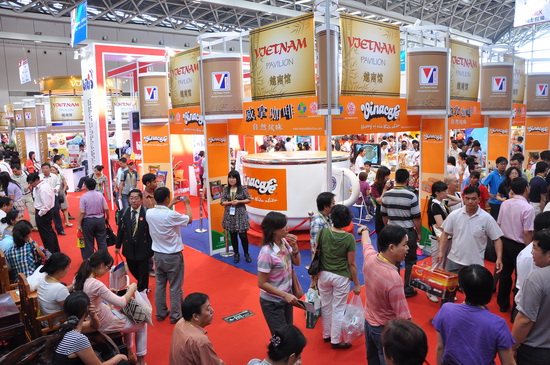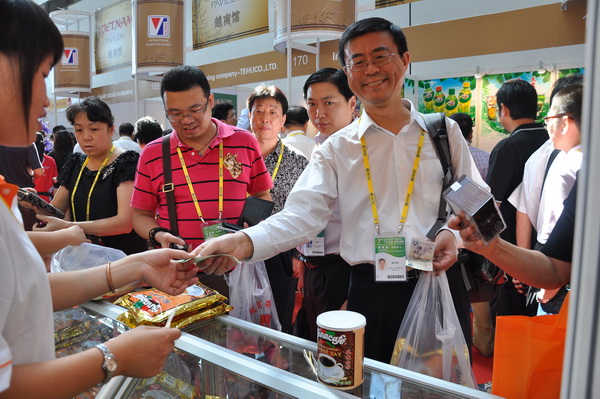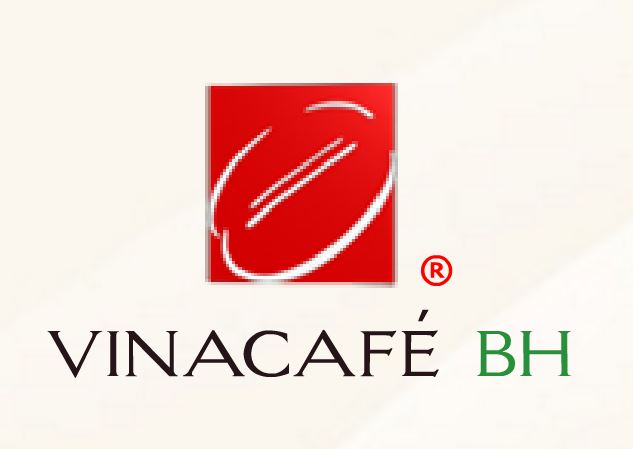 NANNING, Oct. 23 (Xinhua) -- Vietnam's Pham Quang Vu's exhibition booth at the 7th China-ASEAN Expo is among the fair's most popular. Visitors can not resist the drifting aroma from his coffee samples and swarm into his booth to try one cup while taking pictures in front of a huge coffee cup at the booth, which takes four people, hand-in-hand together, to surround.
NANNING, Oct. 23 (Xinhua) -- Vietnam's Pham Quang Vu's exhibition booth at the 7th China-ASEAN Expo is among the fair's most popular. Visitors can not resist the drifting aroma from his coffee samples and swarm into his booth to try one cup while taking pictures in front of a huge coffee cup at the booth, which takes four people, hand-in-hand together, to surround.

Pham Quang Vu is the general director of the Chinese market of Vietnam's leading coffee company, Vietnam's Vinacafe Bien Hoa Joint Stock Co. He has participated in the Expo for seven years.
"Business has now become more and more convenient thanks to the China-ASEAN free trade area (CAFTA) and easier Yuan settlement for trade between Chinese buyers and us. We now use both the U.S. dollars and Chinese RMB for purchases, but due to the risk of the U.S. dollar's frequent foreign exchange rate fluctuations, the company's turnover was easily affected," Pham told Xinhua during an interview.
"Now I prefer the Chinese Yuan and Vietnamese dong for conducting business," Pham noted.
Pham is not the only one who supports the Yuan's use in business. Many Chinese and ASEAN countries' officials, experts and business people attending the ongoing 7th China-ASEAN Expo in Nanning, capital of southwest China's Guangxi Zhuang Autonomous Region, believe that expanding the Yuan in business between China and ASEAN countries will benefit trade within CAFTA and promote further cooperation.

Buoyed by the zero-tariff framework under the CAFTA, which was established on Jan.1, the annual event attracted more than 2,000 enterprises from home and abroad this year, occupying up to 4,600 exhibition booths, a 15 percent increase from last year.
Li Dongrong, assistant governor of the People's Bank of China, the central bank, said at the 2nd China-ASEAN Summit Forum on Financial Cooperation & Development, which was held during the Expo, that the establishment of the CAFTA not only laid a solid foundation for the regional development of financial cooperation, but also signals great potential for future financial cooperation between China and ASEAN countries.
Li said, "Now the RMB purchase and sales transactions are becoming more active and the bank settlement network is also expanding. These all make companies' investments easier and will promote mutual economic cooperation between China and ASEAN countries."
In July 2009, five major trading cities, including Shanghai and Guangzhou, have received the nod from the central government to use the yuan in overseas trade business - seen as one more step in China's moves to expand the use of its currency globally.
By July this year, the pilot areas had expanded to include 18 provinces, autonomous regions and municipalities. Both Guangxi Zhuang Autonomous Region and Guangdong Province were included. By September 30 this year, cross-border yuan trade settlement in the country had reached 197.1 billion yuan(about 29.5 billion U.S. dollars). Guangxi alone achieved 5 billion yuan, with more than 90 percent of the companies based in ASEAN.
"The central bank will continue to expand yuan trade settlement to make cross border trade and investment more convenient, and will also continue to sign foreign currency swap agreements with relevant countries," Li added.
Edith Cheong Choy Hoong, assistant executive director of the global business division of the Singapore Business Federation, told Xinhua that although U.S. dollars remain the most popularly used international trade settlement currency, the Chinese yuan is gradually internationalizing and this is good for regional economic development and eventually will be good for the world's economy.
CHINA, ASEAN COOPERATION
"We live at a time of accelerated adjustment in the international political and economic landscape and major opportunities in the development of Asia.
The future and destiny of China and ASEAN countries are increasingly closely linked with each other," Jia Qinglin, chairman of the National Committee of the Chinese People's Political Consultative Conference, said Tuesday at the opening ceremony of the 7th China-ASEAN Business and Investment Summit.
China and ASEAN together constitute an influential powerhouse in the world's economy, Vice President of the Republic of Indonesia Boediono said at the opening ceremony of the 7th China-ASEAN Expo.
Boediono noted: "For almost two decades, China has been a reliable partner and played an important role in many of ASEAN's ventures. Now, China presents more opportunities for ASEAN. Likewise, the prosperity and stability of ASEAN are also beneficial to China."
China and ASEAN have vastly increased investment and trade between themselves in recent years, especially after CAFTA was established on Jan. 1, 2010.
With a population of 1.9 billion, CAFTA is the world's third largest FTA -- after the North American FTA and the European FTA -- in terms of trade volume, which is estimated at 4.5 trillion U.S. dollars this year and a combined gross domestic product (GDP) of 6 trillion U.S. dollars.
NO WINNERS IN CURRENCY WAR
HRH Norodom Sirivudh, president of the Cambodian Institute for Cooperation and Peace, said a country's foreign exchange management and exchange rate regime should fit its economic basis. "I support China's policy of gradually increasing the flexibility of its currency and keeping the exchange rate of the yuan basically stable at a reasonable and balanced level," he said.
Yang Mu, senior research fellow of the East Asian Institute of the National University of Singapore, told Xinhua there are no winners in a currency war. He pointed out that the result of such a war is to abandon cooperation and coordination between all countries and cause a currency depreciation competition.
"A country's short-term export competitive advantage gained by a lower exchange rate will be quickly counteracted by similar policies of other nations," he said.
The 7th China-ASEAN Expo opened Tuesday in Nanning, the capital of south China's Guangxi Zhuang Autonomous Region, under the theme "Free Trade and New Opportunities." It is the first expo to be held since the creation of the China-ASEAN free trade area (CAFTA).
The event will conclude on October 24.
(Xinhua reporters Wang Mian, Liu Xiaoli, Xiong Hongming, Zhang Le also contributed to the story.)
Editor: Yang Lina




